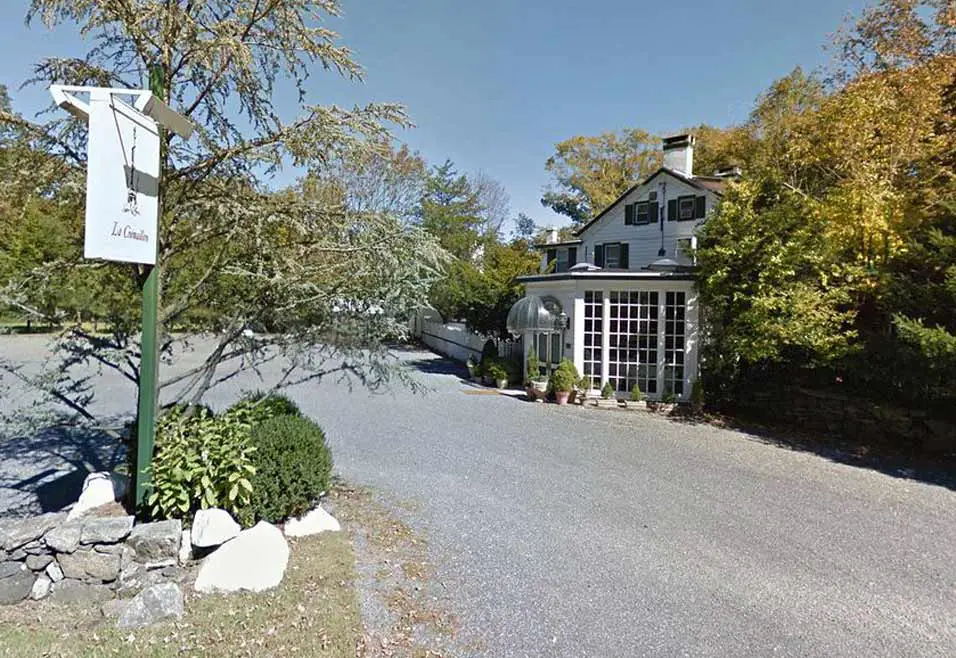
La Crémaillère, the famed French restaurant in Bedford, was on the verge of selling the business for $2.5 million when a bankruptcy judge approved a trustee this week to investigate possible fraud after the FBI arrested co-owner Barbara Meyzen on accusations of cooking the books.
“Management has lost all credibility,” attorney Andrea B. Schwartz wrote in a request for appointment of a trustee to manage the restaurant and real estate for creditors.
Meyzen has been implicated in “rampant financial fraud,” according to a statement issued by U.S. Attorney Geoffrey S. Berman.
Her criminal attorney, Kerry Lawrence, said, “We look forward to resolving the charges against her.”
“Ms. Meyzen and her husband and family have owned La Cremaillere for decades,” he said, “and it is truly one of the great French restaurants on the East Coast.”
La Crémaillère is housed in a 1750s farmhouse on Bedford-Banksville Road, on the Connecticut border, and for many years it has been acclaimed as one of the finest examples of French country cooking in the Northeast.
Barbara Meyzen, also known as Bobbie, and her husband, Robert Olivier Meyzen, are co-owners and have run the restaurant since 1993.
The criminal complaint describes several alleged schemes.
In 2013, the Meyzens borrowed $155,000 from a niece, Judy Smith of Fort Worth, Texas. The loan was secured by a mortgage. In 2017, a document was submitted over the internet to the Westchester County Clerk by “Bobbie Meyzen,” purportedly signed by Smith and a Texas notary, stating that the loan had been paid.
The loan had not been paid off, Smith stated in a lawsuit last year, and the signatures were forgeries.
In 2015, the Meyzens were looking for new financing, according to the criminal complaint. Barbara Meyzen allegedly gave doctored bank statements to nine potential lenders, changing negative account balances to positive balances and removing information on bounced checks.
In 2017, a Stamford woman who was a friend of Barbara Meyzen and a frequent customer of La Crémaillère, entrusted Meyzen with her American Express card number to automatically bill for meals. Meyzen allegedly used it to buy $80,000 worth of fruits, vegetables, cheeses and other goods.
When her friend confronted Meyzen, she said it was a mistake and promised to fix the problem. She allegedly gave the woman two checks on the restaurant”™s bank account, totaling $32,000. They bounced.
Meyzen Family Realty Associates LLC, owner of the farmhouse and 3.75-acre property, filed for Chapter 11 bankruptcy protection in September 2018, declaring $2.8 million in assets and $1.45 million in liabilities.
La Crémaillère Restaurant Corp. filed for Chapter 11 in April declaring $1.4 million in assets and more than $2 million in liabilities.
Two days after filing the restaurant bankruptcy, Barbara Meyzen opened a new bank account in her name and diverted more than $40,000 in restaurant credit card receipts to the account, according to the criminal complaint. She allegedly opened another account with a White Plains bank, in the name of Honey Bee Farm LLC, and diverted more restaurant funds to the account.
This past May, Barbara Meyzen allegedly gave the U.S. trustee misleading information about insurance coverage on the property, when she knew that the insurance had been canceled for nonpayment.
Federal prosecutors accused her of identity theft, wire fraud, mail fraud, credit card fraud, concealing a debtor”™s property and making false statements to investigators.
According to a bankruptcy court document filed June 21, Meyzen Realty had “repeatedly provided fraudulent documents to Celtic Bank.” Celtic had loaned $900,500 to Meyzen Realty in 2013.
The realty company had told the bank that it had a payment plan for state taxes and was up to date with payments. But the documents provided to the bank were allegedly altered, and according to a state tax official, the restaurant has had five installment payment agreements and defaulted on every one.
The state Department of Taxation and Finance filed a $520,022 claim against La Crémaillère on July 15.
When Barbara Meyzen was questioned at a bankruptcy creditor”™s meeting on June 10 about the tax payment plan and loan from her niece, she declined to answer and asserted her Fifth Amendment right not to testify.
Just a few weeks ago, things were looking brighter for La Cr̩maill̬re. The restaurantӪs bankruptcy attorney had hired business broker Silvio Benedetto to find a buyer.
He had queried numerous French restaurants in the region, such as Le Provençal Bistro in Mamaroneck, Bistro Versailles in Greenwich and La Panetiere in Rye. He contacted potential buyers such as Martha Stewart, Mario Batali and Joseph Bastianich. He consulted with wine merchants such as Zachys and Acker Merrall & Condit.
“French restaurants are not doing well and many are for sale,” Benedetto stated in a July 17 report. “Most of the prospects I offered the restaurant to felt the price was out of line, as is the location nestled in back country.”
He considered breaking the sale into three options: wine cellar, real estate and the business.
He estimated that the wine cellar, valued at nearly $1.3 million in La Cr̩maill̬reӪs Chapter 11 petition, was worth $250,000 to $360,000. The real estate could fetch $2.1 million to $2.6 million. The restaurant could command $250,000 to $300,000. Total price, he estimated, could be $3.5 million to $3.8 million.
Ray Balidemaj, owner and chef of Alba”™s Restaurant in Port Chester, offered $2.5 million.
He demanded a 60-day due diligence period, to inspect the property, and he proposed a Sept. 1 closing. He wanted to execute a purchase “as expeditiously as possible.”
“This letter constitutes a mere expression of interest,” he stated, “and does not represent a binding offer.”
He signed the document July 17 and it was submitted to bankruptcy court on July 19. It had not been signed yet by the Meyzens.
Four days later, Barbara Meyzen, 57, of Redding, Connecticut, was arrested. She was released from custody on a $250,000 bond. The following day a bankruptcy judge approved the appointment of a trustee to manage the bankrupted companies.






















